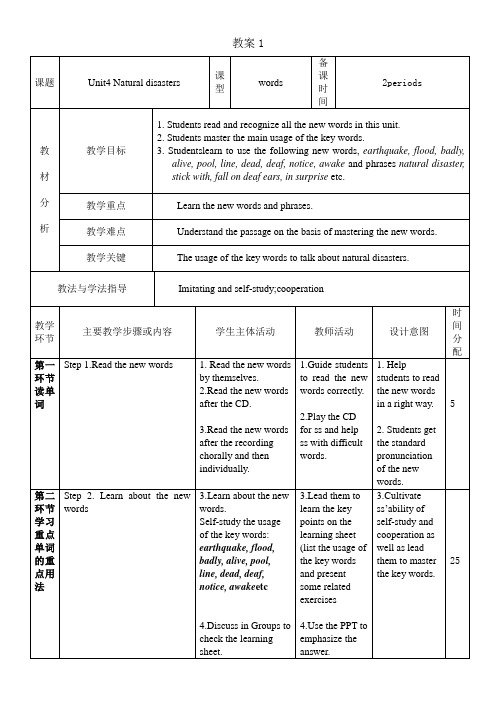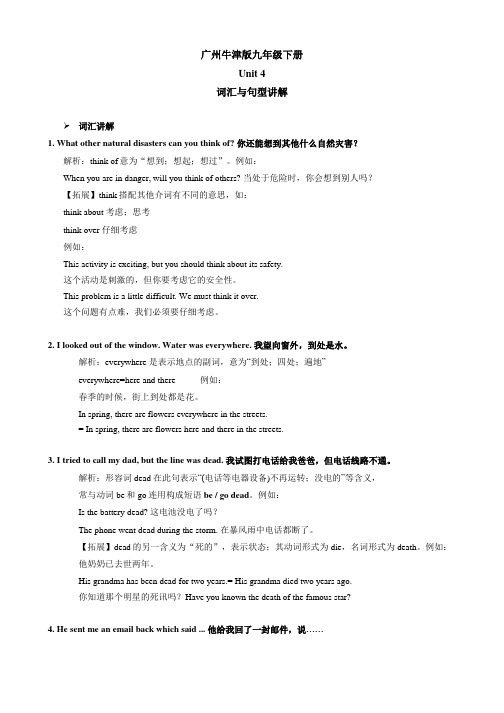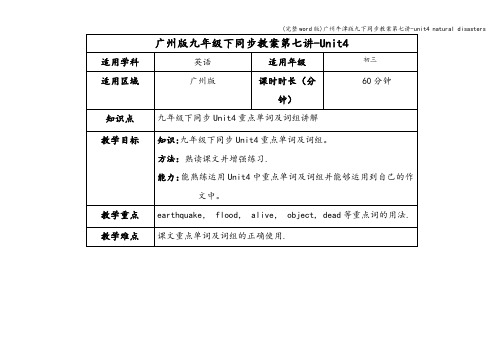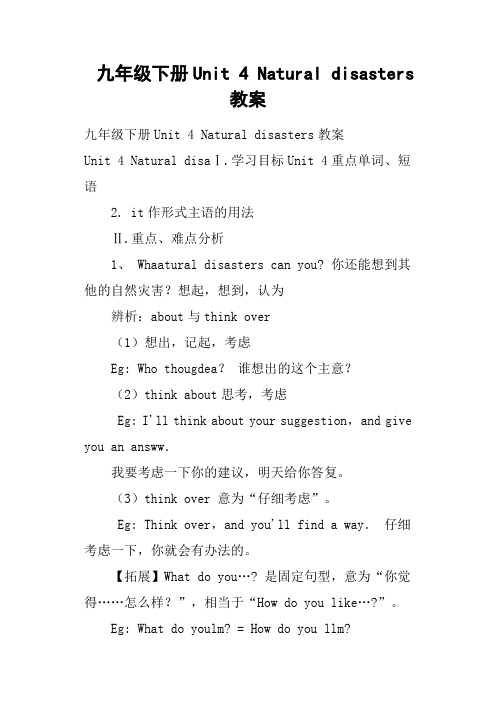广州版 九年级英语 下册--unit4 natural disaster教学教材
- 格式:doc
- 大小:32.00 KB
- 文档页数:7



广州牛津版九年级下册Unit 4词汇与句型讲解➢词汇讲解1. What other natural disasters can you think of?你还能想到其他什么自然灾害?解析:think of意为“想到;想起;想过”。
例如:When you are in danger, will you think of others? 当处于危险时,你会想到别人吗?【拓展】think搭配其他介词有不同的意思,如:think about 考虑;思考think over 仔细考虑例如:This activity is exciting, but you should think about its safety.这个活动是刺激的,但你要考虑它的安全性。
This problem is a little difficult. We must think it over.这个问题有点难,我们必须要仔细考虑。
2. I looked out of the window. Water was everywhere. 我望向窗外,到处是水。
解析:everywhere 是表示地点的副词,意为“到处;四处;遍地”everywhere=here and there 例如:春季的时候,街上到处都是花。
In spring, there are flowers everywhere in the streets.= In spring, there are flowers here and there in the streets.3.I tried to call my dad, but the line was dead.我试图打电话给我爸爸,但电话线路不通。
解析:形容词dead 在此句表示“(电话等电器设备)不再运转;没电的”等含义,常与动词be和go连用构成短语be / go dead。
例如:Is the battery dead? 这电池没电了吗?The phone went dead during the storm. 在暴风雨中电话都断了。

教学过程一、课堂导入引导学生谈谈目前我们所面临的自然灾害。
二、复习预习教师引导学生复习上节课所学的单词及词组的用法,针对上节课的作业进行讲评、订正、答疑。
三、知识讲解知识点1:重点单词的用法1.flood v.(使)灌满水,淹没The cellar floods whenever it rains heavily。
拓展:(1)flood in /into 大量涌入(2)flood …with 挤满,充满2.pass 通过,走过Several people were passing but nobady offered to help.拓展:pass 及格,合格I'm not really expecting to pass first time.3.dead adj。
不运行的,不转动的Suddenly the phone went dead。
拓展:dead adj。
死的He dropped dead last week。
4. stare v。
盯着看,注视The man stared me up and down。
拓展:stare at 盯,凝视知识点2:重点词组的用法1.have no time to do 不愿为……花时间,没有时间做…….I’m busy and I have no time to play basketball with you. 2。
In surprise ,people finally started to notice the flood.in surprise 惊讶地She looked at me in surprise。
知识点3:重点句型1.It's important to stick with it。
(1)It's+adj。
+to do sth.做某事是……的It’s necessary to learn English well。

《Natural disasters》说课稿尊敬的各位评委老师:大家好!今天我说课的内容是《Natural disasters》。
下面我将从教材分析、学情分析、教学目标、教学重难点、教法与学法、教学过程以及教学反思这几个方面来展开我的说课。
一、教材分析本节课所选教材是教材名称,本单元以“Natural disasters”为主题,介绍了各种常见的自然灾害,如地震、洪水、飓风等。
教材内容丰富多样,包括了文本、图片、图表等多种形式,旨在帮助学生了解自然灾害的特点、危害以及应对措施,同时提高学生的英语语言综合运用能力。
本单元的教材内容在编排上具有以下特点:1、主题明确:紧扣“Natural disasters”这一主题,使学生能够系统地学习相关知识。
2、语言实用:文本中使用了大量与自然灾害相关的词汇和句型,有助于学生在实际交流中准确表达。
3、培养能力:通过阅读、听力、写作等多种活动,培养学生的语言技能和综合素养。
二、学情分析本次授课的对象是年级的学生,他们已经具备了一定的英语基础知识和语言运用能力。
在学习风格方面,这个年龄段的学生好奇心强,喜欢直观、生动的教学方式。
然而,他们在词汇量、语法掌握以及阅读和写作技巧上还存在一些不足,对于较为复杂的英语文本理解可能会有一定的困难。
三、教学目标基于对教材和学情的分析,我制定了以下教学目标:1、知识目标(1)学生能够掌握与自然灾害相关的词汇,如 earthquake, flood, hurricane 等。
(2)学生能够理解并运用描述自然灾害的句型,如“An earthquake happened in ” “The flood caused a lot of damage”2、技能目标(1)通过阅读训练,提高学生的阅读理解能力,能够获取文本中的关键信息。
(2)通过写作练习,培养学生用英语描述自然灾害的能力,包括其发生的时间、地点、危害和应对措施。
3、情感目标(1)让学生了解自然灾害的危害,增强对自然的敬畏之心。

九年级下册Unit 4 Natural disasters教案九年级下册Unit 4 Natural disasters教案Unit 4 Natural disaⅠ.学习目标Unit 4重点单词、短语2. it作形式主语的用法Ⅱ.重点、难点分析1、 Whaatural disasters can you? 你还能想到其他的自然灾害?想起,想到,认为辨析:about与think over(1)想出,记起,考虑Eg: Who thougdea?谁想出的这个主意?(2)think about思考,考虑Eg: I'll think about your suggestion,and give you an answw.我要考虑一下你的建议,明天给你答复。
(3)think over 意为“仔细考虑”。
Eg: Think over,and you'll find a way.仔细考虑一下,你就会有办法的。
【拓展】What do you…? 是固定句型,意为“你觉得……怎么样?”,相当于“How do you like…?”。
Eg: What do youlm? = How do you llm?2、BecaudNorth and South Poles. 因为他对南北极感兴趣。
bd in 对…..感兴趣,后面跟名词或者动名词作宾语。
The bdThey ad in playing computer ga辨析:d与gIg表示事物本身具有使人产生兴趣之处;如The cag.而d表示某人对某事感兴趣;如I adbook bougda、What would haur city was badly flooded? 如果我们的城市严重淹水,将会发生什么事情?happen是不及物动词。
happen的用法主要有以下三种:(1)"sth.+happen+地点/时间",意为"某地/某时发生了某事"。
Unit4Naturaldisasters1.用法集萃1. starttodosth. 开始做某事todosth. 一定/不得不做某事todosth. 试图/全力做某事is/wasadj.todosth. 做某事是......的todosth. 负担得起做某事notimetodosth. 没有时间做某事seemsthat+从句doingsth. 停止做某事sb.todosth. 让某人做某事abletodosth. 能够做某事doingsth. 建议做某事takes(sb.)sometimetodosth(.某人)花销多少时间做某事+宾语+形容词使某人/某物......sb.+doingsth. 发现某人正在做某事sb.dosth. 让某人做某事16.adj./adv.enoughtodosth 足够......能够做某事betterdosth. 最好做某事sb.(to)dosth. 帮助某人做某事sb.todosth. 期望某人做某事doingsth. 向来做某事经典句型It’simportanttostickwithit.坚持工作很重要。
Ihavenotimetothinkabouttheflood.我没有时间考虑洪水。
Ittookalongtimetobuildthehouse.建这座房屋花了很长时间。
Itseemsthatnobodyispayinganyattentiontotheflood.仿佛没有人关注那场洪水。
Itisnotagoodideatositaroundandworryabouttheflood.闲坐着担忧洪水不是一个好想法。
重点语法it作形式主语的用法代词it能够用来取代一个名词、一个短语、一个句子,在句中作主语或宾语。
本单元学习it作形式主语的几种状况:A.it作非人称代词表示天气,日期,时间,温度,距离,价值,行程,胸怀,自然现象与环境等,也可模糊地指一般情况或上文的部分或整个意思。
广州版九年级英语下册--u n i t4n a t u r a l d i s a s t e r九年级下册Unit 4 Natural disasters单元总结及练习【必记单词】1)earthquake n.地震2)flood n.(使)灌满水,淹没3)badly adv.严重地,厉害地4)alive adj.活着,在世5)pool n.水坑,水塘6)pass v.通过7)dead adj.(因为缺电)不运行的8)stare v.盯着看,凝视,注视9)notice v.注意到,意识到10)awake v.(使)醒来11)immediately adv.马上,即刻12)missing adj.失踪的【短语归纳】1.natural disaster 自然灾害2.think of 想起,想到3.be interested in ... 对......感兴趣4.be worried about 担心5.dream about 梦见,梦到6.such as 例如7.pass by 通过;经过8.stick with 持续,坚持9.worry about 担心10.think about 考虑11.stare at 盯着看,凝视12.in surprise 惊讶地13.for now 暂时14.so...that... 如此......以至于......15.wait for 等候16.pack up 收拾行李17.for example 例如18.write down写下19.survival kit 救生包20.in the end最后21.from...to... 例如22.how far 多远23.pay attention to 注意,留心 24.fall down倒塌25.at once 立刻 26.as...as possible 尽可能......地27.wake up 醒来 28.in case of 假如29.stay away from... 远离......30.sit around 无所事事地消磨时间;闲坐31.fall on deaf ears 不被理睬,不被注意【用法集萃】1.start to do sth. 开始做某事2.have to do sth.必须/不得不做某事3.try to do sth. 试图/尽力做某事4.it is/was adj. to do sth. 做某事是......的5.afford to do sth. 负担得起做某事6.have no time to do sth. 没有时间做某事7.it seems that +从句似乎......8.want to do sth. 想要做某事9.stop doing sth. 停止做某事10.ask sb. to do sth. 让某人做某事11.be able to do sth. 能够做某事12.suggest doing sth. 建议做某事13.It takes (sb.) some time to do sth.(某人)花费多少时间做某事14.make +宾语+形容词使某人/某物......15.find sb.+doing sth. 发现某人正在做某事16.let sb. do sth. 让某人做某事17.adj./adv. enough to do sth 足够......可以做某事18.had better do sth. 最好做某事19.help sb. (to) do sth. 帮助某人做某事20.expect sb. to do sth. 期待某人做某事21.keep doing sth. 一直做某事【经典句型】1. It’s important to stick with it.坚持工作很重要。
2. I have no time to think about the flood.我没有时间考虑洪水。
3. It took a long time to build the house.建这座房子花了很长时间。
4. It seems that nobody is paying any attention to the flood.似乎没有人关注那场洪水。
5. It is not a good idea to sit around and worry about the flood.闲坐着担心洪水不是一个好主意。
【重点语法】it 作形式主语的用法代词it可以用来代替一个名词、一个短语、一个句子,在句中作主语或宾语。
本单元学习it作形式主语的几种情况。
1. it作主语指时间、日期、天气、距离和气温等。
It’s nine o’clock now. (指时间)It is much colder than it was yesterday. (指天气)It is about 5 kilometres from here to my home. (指距离)It is very hot in the classroom. (指气温)It is Sunday today. (指日期)2. It作形式主语代替动词不定式,常用于以下句型中:(1) it is/was adj. (of/for) sb. to do sth.当表语是与事物的特征有关的形容词时,如easy, difficult, hard, important, necessary等,用介词for.It is difficult for Lucy to learn physics.It is interesting for us to play badminton.当表语是描述人的性格、品质的形容词时,如kind, nice, polite, clever, foolish, stupid等,用介词of.It is kind of you to help me.It is clever of the little child to work out such a difficult math problem.(2) it takes/took sb. some time to do sth.It takes him an hour to do his homework every day.(3) it is/was n. to do sth.It is great fun to have a party here.It was a great pleasure to work with you.3.it作形式主语还常用于句型“it seems/appears that +从句”,表示“似乎/好像/看来......”It seems that he knows everything.It appears that we are wrong.单元练习一、根据句意及首字母或汉语提示完成单词。
1. The old man is d_________. He can’t hear anything.2. My dog is m__________. Can you help me find it?3. All of them are ___________(注视)at the computer screen.4. We don’t know whether he’s _________(活着)or dead.5. The road was so narrow(狭窄)that cars were unable to _________(通过).二、用所给单词的适当形式填空1. This was the worst ___________(nature) disaster in the history of the United States.2. Look! There are two _________(coach) in front of our school.3. Some countries would be _________(flood) if sea level around the world rose.4. I have no time _________(think) about these questions.5. Mary suggested _________(go) there by bus and I agreed.三、单项选择1. ---____________ is it from here to the railway station?---About ten kilometres.A.How farB.How fastC.How soonD.How often2. Mary feels unhappy because nobody seems to _________ her progress.A.noticeB.lookC.watchD.read3. What _________ it is!A.nice dayB.nice weatherC.a nice weatherD.nice a weather4. The line is __________. What should we do?A.deafB.aliveC.deadD.missing5. He hurt her _________ badly ________ she had to see a doctor.A.too; thatB.so; thatC.either; orD.too; to6. Each of us has to write a __________________ report every two weeks.A.two-hundred-wordB.two-hundreds-wordC.two-hundreds-wordsD.two-hundred-words7.---May I listen to music here, Mr. White?---Sorry, you’d better ________ it like that.A.not to doB.not doC.don’t doD.not do to8. My daughter wants a rabbit for long, but I have no time to buy _________for her.A.itB.oneC.the oneD.that9. His friends asked him ____________ up smoking.A.giveB.to giveC.gaveD.giving10. When she heard the news, she looked at me __________ surprise.A.forB.toC.atD.in11. The little boy is ________ lovely ________ everyone likes him.A.such; thatB.too; toC.so; thatD.enough; that12. __________ foggy day!A. HowB. WhatC.How aD. What a13. Finish your homework first, and then you’ll ___________ watch TV for an hour.A.canB.be able toC.able toD.could14. Our teacher often asks us _________ questions in groups.A.discussB.to discussC.discussingD.discussed15. What a pity! Liu Xiang didn’t win the ___________ hurdles(跨栏).A.110-metreB.110-metresC.110 metreD.110 metes16. ---Do you know that Mr. Zhang passes ________ last week?---Yes. He died _____________ illness.A.away; ofB.on; fromC.by; withD.off; as17. He lost his key. It made him _________ in the cold to wait for his wife’s return.A.to stayB.stayedC.staysD.stay18. ---You’d better _________ early. It is good for your health.---Thanks. I’ll do as you say.A.get upB.to get upC.getting upD.got up四、根据汉语意思完成句子。